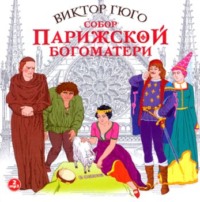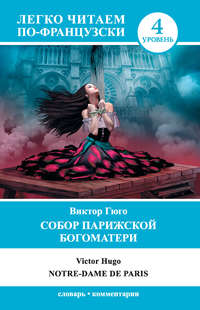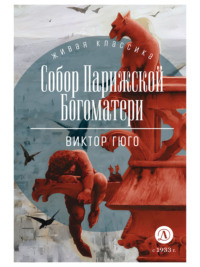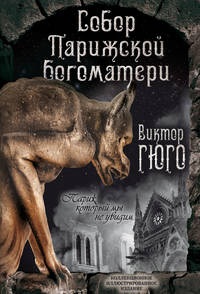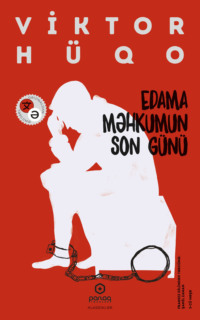 полная версия
полная версияLes Misérables
No one had seen her, except the traveller, who was slowly devouring his meagre supper.
This joy lasted about a quarter of an hour.
But with all the precautions that Cosette had taken she did not perceive that one of the doll’s legs stuck out and that the fire on the hearth lighted it up very vividly. That pink and shining foot, projecting from the shadow, suddenly struck the eye of Azelma, who said to Éponine, “Look! sister.”
The two little girls paused in stupefaction; Cosette had dared to take their doll!
Éponine rose, and, without releasing the cat, she ran to her mother, and began to tug at her skirt.
“Let me alone!” said her mother; “what do you want?”
“Mother,” said the child, “look there!”
And she pointed to Cosette.
Cosette, absorbed in the ecstasies of possession, no longer saw or heard anything.
Madame Thénardier’s countenance assumed that peculiar expression which is composed of the terrible mingled with the trifles of life, and which has caused this style of woman to be named Megaeras.
On this occasion, wounded pride exasperated her wrath still further. Cosette had overstepped all bounds; Cosette had laid violent hands on the doll belonging to “these young ladies.” A czarina who should see a muzhik trying on her imperial son’s blue ribbon would wear no other face.
She shrieked in a voice rendered hoarse with indignation: —
“Cosette!”
Cosette started as though the earth had trembled beneath her; she turned round.
“Cosette!” repeated the Thénardier.
Cosette took the doll and laid it gently on the floor with a sort of veneration, mingled with despair; then, without taking her eyes from it, she clasped her hands, and, what is terrible to relate of a child of that age, she wrung them; then – not one of the emotions of the day, neither the trip to the forest, nor the weight of the bucket of water, nor the loss of the money, nor the sight of the whip, nor even the sad words which she had heard Madame Thénardier utter had been able to wring this from her – she wept; she burst out sobbing.
Meanwhile, the traveller had risen to his feet.
“What is the matter?” he said to the Thénardier.
“Don’t you see?” said the Thénardier, pointing to the corpus delicti which lay at Cosette’s feet.
“Well, what of it?” resumed the man.
“That beggar,” replied the Thénardier, “has permitted herself to touch the children’s doll!”
“All this noise for that!” said the man; “well, what if she did play with that doll?”
“She touched it with her dirty hands!” pursued the Thénardier, “with her frightful hands!”
Here Cosette redoubled her sobs.
“Will you stop your noise?” screamed the Thénardier.
The man went straight to the street door, opened it, and stepped out.
As soon as he had gone, the Thénardier profited by his absence to give Cosette a hearty kick under the table, which made the child utter loud cries.
The door opened again, the man reappeared; he carried in both hands the fabulous doll which we have mentioned, and which all the village brats had been staring at ever since the morning, and he set it upright in front of Cosette, saying: —
“Here; this is for you.”
It must be supposed that in the course of the hour and more which he had spent there he had taken confused notice through his reverie of that toy shop, lighted up by fire-pots and candles so splendidly that it was visible like an illumination through the window of the drinking-shop.
Cosette raised her eyes; she gazed at the man approaching her with that doll as she might have gazed at the sun; she heard the unprecedented words, “It is for you”; she stared at him; she stared at the doll; then she slowly retreated, and hid herself at the extreme end, under the table in a corner of the wall.
She no longer cried; she no longer wept; she had the appearance of no longer daring to breathe.
The Thénardier, Éponine, and Azelma were like statues also; the very drinkers had paused; a solemn silence reigned through the whole room.
Madame Thénardier, petrified and mute, recommenced her conjectures: “Who is that old fellow? Is he a poor man? Is he a millionaire? Perhaps he is both; that is to say, a thief.”
The face of the male Thénardier presented that expressive fold which accentuates the human countenance whenever the dominant instinct appears there in all its bestial force. The tavern-keeper stared alternately at the doll and at the traveller; he seemed to be scenting out the man, as he would have scented out a bag of money. This did not last longer than the space of a flash of lightning. He stepped up to his wife and said to her in a low voice: —
“That machine costs at least thirty francs. No nonsense. Down on your belly before that man!”
Gross natures have this in common with naïve natures, that they possess no transition state.
“Well, Cosette,” said the Thénardier, in a voice that strove to be sweet, and which was composed of the bitter honey of malicious women, “aren’t you going to take your doll?”
Cosette ventured to emerge from her hole.
“The gentleman has given you a doll, my little Cosette,” said Thénardier, with a caressing air. “Take it; it is yours.”
Cosette gazed at the marvellous doll in a sort of terror. Her face was still flooded with tears, but her eyes began to fill, like the sky at daybreak, with strange beams of joy. What she felt at that moment was a little like what she would have felt if she had been abruptly told, “Little one, you are the Queen of France.”
It seemed to her that if she touched that doll, lightning would dart from it.
This was true, up to a certain point, for she said to herself that the Thénardier would scold and beat her.
Nevertheless, the attraction carried the day. She ended by drawing near and murmuring timidly as she turned towards Madame Thénardier: —
“May I, Madame?”
No words can render that air, at once despairing, terrified, and ecstatic.
“Pardi!” cried the Thénardier, “it is yours. The gentleman has given it to you.”
“Truly, sir?” said Cosette. “Is it true? Is the ‘lady’ mine?”
The stranger’s eyes seemed to be full of tears. He appeared to have reached that point of emotion where a man does not speak for fear lest he should weep. He nodded to Cosette, and placed the “lady’s” hand in her tiny hand.
Cosette hastily withdrew her hand, as though that of the “lady” scorched her, and began to stare at the floor. We are forced to add that at that moment she stuck out her tongue immoderately. All at once she wheeled round and seized the doll in a transport.
“I shall call her Catherine,” she said.
It was an odd moment when Cosette’s rags met and clasped the ribbons and fresh pink muslins of the doll.
“Madame,” she resumed, “may I put her on a chair?”
“Yes, my child,” replied the Thénardier.
It was now the turn of Éponine and Azelma to gaze at Cosette with envy.
Cosette placed Catherine on a chair, then seated herself on the floor in front of her, and remained motionless, without uttering a word, in an attitude of contemplation.
“Play, Cosette,” said the stranger.
“Oh! I am playing,” returned the child.
This stranger, this unknown individual, who had the air of a visit which Providence was making on Cosette, was the person whom the Thénardier hated worse than any one in the world at that moment. However, it was necessary to control herself. Habituated as she was to dissimulation through endeavoring to copy her husband in all his actions, these emotions were more than she could endure. She made haste to send her daughters to bed, then she asked the man’s permission to send Cosette off also; “for she has worked hard all day,” she added with a maternal air. Cosette went off to bed, carrying Catherine in her arms.
From time to time the Thénardier went to the other end of the room where her husband was, to relieve her soul, as she said. She exchanged with her husband words which were all the more furious because she dared not utter them aloud.
“Old beast! What has he got in his belly, to come and upset us in this manner! To want that little monster to play! to give away forty-franc dolls to a jade that I would sell for forty sous, so I would! A little more and he will be saying Your Majesty to her, as though to the Duchesse de Berry! Is there any sense in it? Is he mad, then, that mysterious old fellow?”
“Why! it is perfectly simple,” replied Thénardier, “if that amuses him! It amuses you to have the little one work; it amuses him to have her play. He’s all right. A traveller can do what he pleases when he pays for it. If the old fellow is a philanthropist, what is that to you? If he is an imbecile, it does not concern you. What are you worrying for, so long as he has money?”
The language of a master, and the reasoning of an innkeeper, neither of which admitted of any reply.
The man had placed his elbows on the table, and resumed his thoughtful attitude. All the other travellers, both pedlers and carters, had withdrawn a little, and had ceased singing. They were staring at him from a distance, with a sort of respectful awe. This poorly dressed man, who drew “hind-wheels” from his pocket with so much ease, and who lavished gigantic dolls on dirty little brats in wooden shoes, was certainly a magnificent fellow, and one to be feared.
Many hours passed. The midnight mass was over, the chimes had ceased, the drinkers had taken their departure, the drinking-shop was closed, the public room was deserted, the fire extinct, the stranger still remained in the same place and the same attitude. From time to time he changed the elbow on which he leaned. That was all; but he had not said a word since Cosette had left the room.
The Thénardiers alone, out of politeness and curiosity, had remained in the room.
“Is he going to pass the night in that fashion?” grumbled the Thénardier. When two o’clock in the morning struck, she declared herself vanquished, and said to her husband, “I’m going to bed. Do as you like.” Her husband seated himself at a table in the corner, lighted a candle, and began to read the Courrier Français.
A good hour passed thus. The worthy inn-keeper had perused the Courrier Français at least three times, from the date of the number to the printer’s name. The stranger did not stir.
Thénardier fidgeted, coughed, spit, blew his nose, and creaked his chair. Not a movement on the man’s part. “Is he asleep?” thought Thénardier. The man was not asleep, but nothing could arouse him.
At last Thénardier took off his cap, stepped gently up to him, and ventured to say: —
“Is not Monsieur going to his repose?”
Not going to bed would have seemed to him excessive and familiar. To repose smacked of luxury and respect. These words possess the mysterious and admirable property of swelling the bill on the following day. A chamber where one sleeps costs twenty sous; a chamber in which one reposes costs twenty francs.
“Well!” said the stranger, “you are right. Where is your stable?”
“Sir!” exclaimed Thénardier, with a smile, “I will conduct you, sir.”
He took the candle; the man picked up his bundle and cudgel, and Thénardier conducted him to a chamber on the first floor, which was of rare splendor, all furnished in mahogany, with a low bedstead, curtained with red calico.
“What is this?” said the traveller.
“It is really our bridal chamber,” said the tavern-keeper. “My wife and I occupy another. This is only entered three or four times a year.”
“I should have liked the stable quite as well,” said the man, abruptly.
Thénardier pretended not to hear this unamiable remark.
He lighted two perfectly fresh wax candles which figured on the chimney-piece. A very good fire was flickering on the hearth.
On the chimney-piece, under a glass globe, stood a woman’s head-dress in silver wire and orange flowers.
“And what is this?” resumed the stranger.
“That, sir,” said Thénardier, “is my wife’s wedding bonnet.”
The traveller surveyed the object with a glance which seemed to say, “There really was a time, then, when that monster was a maiden?”
Thénardier lied, however. When he had leased this paltry building for the purpose of converting it into a tavern, he had found this chamber decorated in just this manner, and had purchased the furniture and obtained the orange flowers at second hand, with the idea that this would cast a graceful shadow on “his spouse,” and would result in what the English call respectability for his house.
When the traveller turned round, the host had disappeared. Thénardier had withdrawn discreetly, without venturing to wish him a good night, as he did not wish to treat with disrespectful cordiality a man whom he proposed to fleece royally the following morning.
The inn-keeper retired to his room. His wife was in bed, but she was not asleep. When she heard her husband’s step she turned over and said to him: —
“Do you know, I’m going to turn Cosette out of doors to-morrow.”
Thénardier replied coldly: —
“How you do go on!”
They exchanged no further words, and a few moments later their candle was extinguished.
As for the traveller, he had deposited his cudgel and his bundle in a corner. The landlord once gone, he threw himself into an armchair and remained for some time buried in thought. Then he removed his shoes, took one of the two candles, blew out the other, opened the door, and quitted the room, gazing about him like a person who is in search of something. He traversed a corridor and came upon a staircase. There he heard a very faint and gentle sound like the breathing of a child. He followed this sound, and came to a sort of triangular recess built under the staircase, or rather formed by the staircase itself. This recess was nothing else than the space under the steps. There, in the midst of all sorts of old papers and potsherds, among dust and spiders’ webs, was a bed – if one can call by the name of bed a straw pallet so full of holes as to display the straw, and a coverlet so tattered as to show the pallet. No sheets. This was placed on the floor.
In this bed Cosette was sleeping.
The man approached and gazed down upon her.
Cosette was in a profound sleep; she was fully dressed. In the winter she did not undress, in order that she might not be so cold.
Against her breast was pressed the doll, whose large eyes, wide open, glittered in the dark. From time to time she gave vent to a deep sigh as though she were on the point of waking, and she strained the doll almost convulsively in her arms. Beside her bed there was only one of her wooden shoes.
A door which stood open near Cosette’s pallet permitted a view of a rather large, dark room. The stranger stepped into it. At the further extremity, through a glass door, he saw two small, very white beds. They belonged to Éponine and Azelma. Behind these beds, and half hidden, stood an uncurtained wicker cradle, in which the little boy who had cried all the evening lay asleep.
The stranger conjectured that this chamber connected with that of the Thénardier pair. He was on the point of retreating when his eye fell upon the fireplace – one of those vast tavern chimneys where there is always so little fire when there is any fire at all, and which are so cold to look at. There was no fire in this one, there was not even ashes; but there was something which attracted the stranger’s gaze, nevertheless. It was two tiny children’s shoes, coquettish in shape and unequal in size. The traveller recalled the graceful and immemorial custom in accordance with which children place their shoes in the chimney on Christmas eve, there to await in the darkness some sparkling gift from their good fairy. Éponine and Azelma had taken care not to omit this, and each of them had set one of her shoes on the hearth.
The traveller bent over them.
The fairy, that is to say, their mother, had already paid her visit, and in each he saw a brand-new and shining ten-sou piece.
The man straightened himself up, and was on the point of withdrawing, when far in, in the darkest corner of the hearth, he caught sight of another object. He looked at it, and recognized a wooden shoe, a frightful shoe of the coarsest description, half dilapidated and all covered with ashes and dried mud. It was Cosette’s sabot. Cosette, with that touching trust of childhood, which can always be deceived yet never discouraged, had placed her shoe on the hearth-stone also.
Hope in a child who has never known anything but despair is a sweet and touching thing.
There was nothing in this wooden shoe.
The stranger fumbled in his waistcoat, bent over and placed a louis d’or in Cosette’s shoe.
Then he regained his own chamber with the stealthy tread of a wolf.
CHAPTER IX – THÉNARDIER AND HIS MANŒUVRES
On the following morning, two hours at least before day-break, Thénardier, seated beside a candle in the public room of the tavern, pen in hand, was making out the bill for the traveller with the yellow coat.
His wife, standing beside him, and half bent over him, was following him with her eyes. They exchanged not a word. On the one hand, there was profound meditation, on the other, the religious admiration with which one watches the birth and development of a marvel of the human mind. A noise was audible in the house; it was the Lark sweeping the stairs.
After the lapse of a good quarter of an hour, and some erasures, Thénardier produced the following masterpiece: —
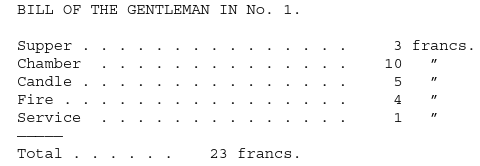
Service was written servisse.
“Twenty-three francs!” cried the woman, with an enthusiasm which was mingled with some hesitation.
Like all great artists, Thénardier was dissatisfied.
“Peuh!” he exclaimed.
It was the accent of Castlereagh auditing France’s bill at the Congress of Vienna.
“Monsieur Thénardier, you are right; he certainly owes that,” murmured the wife, who was thinking of the doll bestowed on Cosette in the presence of her daughters. “It is just, but it is too much. He will not pay it.”
Thénardier laughed coldly, as usual, and said: —
“He will pay.”
This laugh was the supreme assertion of certainty and authority. That which was asserted in this manner must needs be so. His wife did not insist.
She set about arranging the table; her husband paced the room. A moment later he added: —
“I owe full fifteen hundred francs!”
He went and seated himself in the chimney-corner, meditating, with his feet among the warm ashes.
“Ah! by the way,” resumed his wife, “you don’t forget that I’m going to turn Cosette out of doors to-day? The monster! She breaks my heart with that doll of hers! I’d rather marry Louis XVIII. than keep her another day in the house!”
Thénardier lighted his pipe, and replied between two puffs: —
“You will hand that bill to the man.”
Then he went out.
Hardly had he left the room when the traveller entered.
Thénardier instantly reappeared behind him and remained motionless in the half-open door, visible only to his wife.
The yellow man carried his bundle and his cudgel in his hand.
“Up so early?” said Madame Thénardier; “is Monsieur leaving us already?”
As she spoke thus, she was twisting the bill about in her hands with an embarrassed air, and making creases in it with her nails. Her hard face presented a shade which was not habitual with it, – timidity and scruples.
To present such a bill to a man who had so completely the air “of a poor wretch” seemed difficult to her.
The traveller appeared to be preoccupied and absent-minded. He replied: —
“Yes, Madame, I am going.”
“So Monsieur has no business in Montfermeil?”
“No, I was passing through. That is all. What do I owe you, Madame,” he added.
The Thénardier silently handed him the folded bill.
The man unfolded the paper and glanced at it; but his thoughts were evidently elsewhere.
“Madame,” he resumed, “is business good here in Montfermeil?”
“So so, Monsieur,” replied the Thénardier, stupefied at not witnessing another sort of explosion.
She continued, in a dreary and lamentable tone: —
“Oh! Monsieur, times are so hard! and then, we have so few bourgeois in the neighborhood! All the people are poor, you see. If we had not, now and then, some rich and generous travellers like Monsieur, we should not get along at all. We have so many expenses. Just see, that child is costing us our very eyes.”
“What child?”
“Why, the little one, you know! Cosette – the Lark, as she is called hereabouts!”
“Ah!” said the man.
She went on: —
“How stupid these peasants are with their nicknames! She has more the air of a bat than of a lark. You see, sir, we do not ask charity, and we cannot bestow it. We earn nothing and we have to pay out a great deal. The license, the imposts, the door and window tax, the hundredths! Monsieur is aware that the government demands a terrible deal of money. And then, I have my daughters. I have no need to bring up other people’s children.”
The man resumed, in that voice which he strove to render indifferent, and in which there lingered a tremor: —
“What if one were to rid you of her?”
“Who? Cosette?”
“Yes.”
The landlady’s red and violent face brightened up hideously.
“Ah! sir, my dear sir, take her, keep her, lead her off, carry her away, sugar her, stuff her with truffles, drink her, eat her, and the blessings of the good holy Virgin and of all the saints of paradise be upon you!”
“Agreed.”
“Really! You will take her away?”
“I will take her away.”
“Immediately?”
“Immediately. Call the child.”
“Cosette!” screamed the Thénardier.
“In the meantime,” pursued the man, “I will pay you what I owe you. How much is it?”
He cast a glance on the bill, and could not restrain a start of surprise: —
“Twenty-three francs!”
He looked at the landlady, and repeated: —
“Twenty-three francs?”
There was in the enunciation of these words, thus repeated, an accent between an exclamation and an interrogation point.
The Thénardier had had time to prepare herself for the shock. She replied, with assurance: —
“Good gracious, yes, sir, it is twenty-three francs.”
The stranger laid five five-franc pieces on the table.
“Go and get the child,” said he.
At that moment Thénardier advanced to the middle of the room, and said: —
“Monsieur owes twenty-six sous.”
“Twenty-six sous!” exclaimed his wife.
“Twenty sous for the chamber,” resumed Thénardier, coldly, “and six sous for his supper. As for the child, I must discuss that matter a little with the gentleman. Leave us, wife.”
Madame Thénardier was dazzled as with the shock caused by unexpected lightning flashes of talent. She was conscious that a great actor was making his entrance on the stage, uttered not a word in reply, and left the room.
As soon as they were alone, Thénardier offered the traveller a chair. The traveller seated himself; Thénardier remained standing, and his face assumed a singular expression of good-fellowship and simplicity.
“Sir,” said he, “what I have to say to you is this, that I adore that child.”
The stranger gazed intently at him.
“What child?”
Thénardier continued: —
“How strange it is, one grows attached. What money is that? Take back your hundred-sou piece. I adore the child.”
“Whom do you mean?” demanded the stranger.
“Eh! our little Cosette! Are you not intending to take her away from us? Well, I speak frankly; as true as you are an honest man, I will not consent to it. I shall miss that child. I saw her first when she was a tiny thing. It is true that she costs us money; it is true that she has her faults; it is true that we are not rich; it is true that I have paid out over four hundred francs for drugs for just one of her illnesses! But one must do something for the good God’s sake. She has neither father nor mother. I have brought her up. I have bread enough for her and for myself. In truth, I think a great deal of that child. You understand, one conceives an affection for a person; I am a good sort of a beast, I am; I do not reason; I love that little girl; my wife is quick-tempered, but she loves her also. You see, she is just the same as our own child. I want to keep her to babble about the house.”


